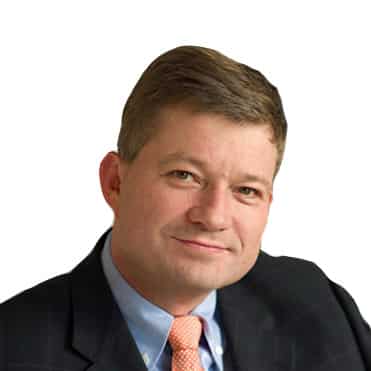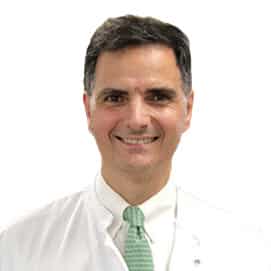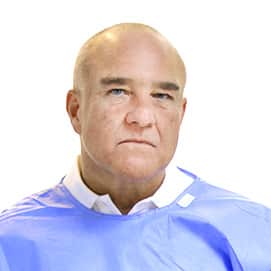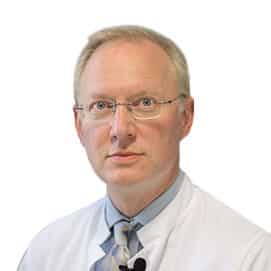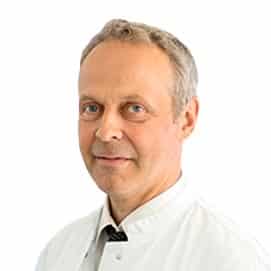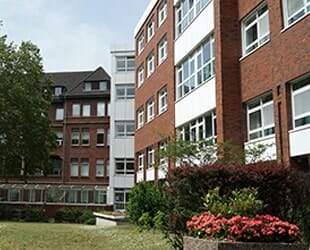After the diagnosis is made, the doctor agrees with the patient on the proposed treatment.
The following treatments are possible:
- Operation
- Radioiodine therapy
- Radiation therapy
- Chemotherapy
- A combination of these forms of therapy
Which form of therapy a patient will receive depends especially on the type of tumor and how far the disease has progressed at the time of diagnosis.
Operation
For thyroid cancer, surgery is the number one treatment option. Its goal is to remove completely tumor tissue and lymph nodes affected by tumor cells in order to achieve complete recovery. The next goal of surgery, especially in differentiated carcinomas, is to remove all of the thyroid tissue to facilitate subsequent radioiodine therapy.
The extent of the operation depends on the type of thyroid carcinoma and the stage of the cancer. If it is a very small papillary carcinoma (less than 1 cm in diameter), then in some cases only the affected lobe of the thyroid gland can be removed. If there is a suspicion that another lobe of the thyroid gland or nearby lymph nodes are also affected, then the thyroid gland must be removed completely along with nearby lymph nodes (thyroidectomy). With large papillary, as well as with follicular, medullary and undifferentiated thyroid carcinomas, the thyroid gland is always completely removed.
If the tumor has invaded adjacent organs, such as the esophagus, trachea, or blood vessels, it may be necessary to partially remove these organs as well. This is done only in cases where it is a differentiated (follicular or papillary) carcinoma, and it is possible to remove the tumor completely.
Removal of lymph nodes (lymphadenectomy)
Papillary and medullary carcinomas often affect the lymph nodes in the neck, sometimes in the upper chest. If there is a suspicion that these lymph nodes are affected, then all the cervical lymph nodes are removed, in some cases, the lymph nodes of the upper chest (lymphadenectomy). This is done for safety, as the tumor spreads through the lymphatics. In addition, a histological examination of the removed lymph nodes determines how much the cancer has actually spread. Especially in medullary carcinomas, the complete removal of all tumor cells during surgery is decisive for the success of the treatment, since additional radioiodine therapy to destroy tumor remnants is not used in this form of cancer.
Treatment after surgery
Treatment after surgery depends on the type of thyroid cancer. With differentiated (papillary and follicular) tumors of the thyroid gland, after removal of the tumor, as a rule, radioiodine therapy is performed. Its goal is to destroy normal thyroid cells remaining in the body, and in some cases also tumor cells and metastases, thereby reducing the likelihood of recurrence. Only for very small papillary carcinomas, which do not require complete removal of the thyroid gland, one operation is sufficient. For advanced, differentiated carcinomas that cannot be completely removed by surgery, additional radiation therapy can be performed to consolidate the success of the treatment. Its goal is to destroy the remnants of the tumor to reduce the risk of recurrence of the disease. Chemotherapy is rarely used.
Radioiodine therapy
Treatment with radioactive iodine (radioiodine therapy) aims to destroy areas of thyroid tissue remaining after surgery and possibly existing metastases. This treatment takes advantage of the fact that the metastases of papillary and follicular thyroid carcinomas, as well as the cells from which these cancers originated, partially accumulate iodine. Radioactive iodine destroys tumor cells without significant damage to other organs. The condition for targeted therapy of metastases is the preliminary radical removal of the entire thyroid tissue.
In non-iodine-accumulating forms of the tumor, such as medullary or poorly differentiated thyroid carcinoma, radioiodine therapy does not make sense.
The first radioiodine therapy is usually carried out 4 weeks after the operation. It serves, as already mentioned, to destroy the smallest remnants of the thyroid gland, which, despite the careful total removal of the thyroid gland, still exist. Thyroid tissue accumulates most of the radioactive iodine, so only after it is destroyed is it possible to accumulate a sufficient amount of radioactive iodine in metastases. During these 4 weeks of preparation for radioiodine therapy, the patient should not take thyroid hormones. Only in this case optimal accumulation of radioactive iodine in metastases is possible. Withdrawal of thyroid hormones is often associated with reduced performance, fatigue, and possibly a slight increase in body weight. These side effects completely disappear when the patient, after radioiodine therapy, begins to take hormones again at the required dose. An alternative to thyroid hormone withdrawal is stimulation with the thyroid-stimulating hormone TSH. It is administered intramuscularly for two days while continuing to take thyroid hormones. This preparation leads to relatively the same accumulation of radioactive iodine, only without the side effects caused by the withdrawal of thyroid hormones. Side effects such as nausea, headaches or skin rashes are rare.
Radioiodine therapy, due to the radiation exposure to which the patient is exposed, requires many days in a specialized nuclear medicine hospital. During this time, visiting the patient is prohibited.
The patient receives radioactive iodine in the form of capsules that dissolve in the stomach. The dosage is selected individually depending on what is found in the patient. The success of the treatment is checked some time after its completion using radioiodine diagnostics. How often radioiodine therapy and radioiodine diagnostics are performed depends on the form of the tumor and its stage.
Radiation therapy
Radiation therapy destroys cancer cells. It is carried out by high-energy electromagnetic waves directed from the outside to the tumor area. Radiation therapy for thyroid cancer is given after surgery or after radioiodine therapy (adjuvant radiation therapy). It aims to destroy the tumor cells or the smallest metastases that may remain in the area of the tumor or in the area of accumulation of lymph nodes.
Radioiodine-responsive thyroid carcinomas, ie, papillary and follicular thyroid cancers, are usually only irradiated if the tumor cannot be completely removed by surgery and radioiodine therapy. In such cases, radiation is also used to suppress the growth of daughter tumors.
In the case of undifferentiated carcinoma, radiation therapy is given either before or after surgery, often in combination with chemotherapy.
Chemotherapy
Chemotherapy aims to kill cancer cells throughout the body with cell-growth-inhibiting drugs (cytostatics). Cytostatics work well against rapidly growing cells, especially cancer cells.
In thyroid cancer, classical chemotherapy with so-called cytostatics plays a secondary role. Only poorly or undifferentiated aggressive thyroid carcinomas respond to some extent to this form of chemotherapy. New substances targeting signal transduction pathways altered due to mutations in the tumor are considered promising for the drug therapy of thyroid carcinomas, which cannot be cured by standard methods. Their use has been shown to slow down or stop tumor growth. These substances either block receptors for tyrosine kinase or inhibit the growth of tumor vessels, thereby reducing its supply of nutrients. To date, few studies of these substances have shown very positive results, and a significant improvement in the prognosis of these tumors is expected in the short term. However, currently used agents such as sorafenib, sunitinib, vandetanib and others have side effects that in some cases prevent continued therapy.
Chemotherapy is prescribed, for example, for patients who cannot be cured by surgery and in whom radioiodine therapy is not possible or makes no sense. The duration of chemotherapy depends on individual tolerance. Using new drugs, it can be carried out for a long time and on an outpatient basis.
Head of the Clinic of Oncology, Hematology and Palliative Medicine
Head of the Clinic for General, Visceral, Thoracic and Endocrine Surgery
Head of the Clinic for Radiation Therapy and Radiological Oncology
Video
Request appointment
Useful links
Photo gallery


